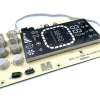
弹簧触摸传感器:工作原理及其应用
您是否曾好奇过您的智能手机屏幕如何即时响应您的触摸?这种无缝交互背后的技术是电容式触摸感应,而实现它的一种创新方法是使用弹簧触摸传感器。在本文中,我们将深入探讨什么是弹簧触摸传感器、它们的工作原理以及它们在当今技术中的各种应用。
什么是弹簧触摸传感器?
弹簧触摸传感器是一种独特的电容式触摸传感器,使用压缩弹簧作为传感元件。与传统的扁平电容式传感器不同,弹簧充当电极,可以检测来自任何方向的触摸。这为产品设计提供了更大的灵活性。
弹簧触摸传感器的主要优点包括:
- 能够透过较厚的覆盖层和外壳感知触摸
- 在恶劣环境下持久可靠的性能
- 允许使用曲面或不规则表面进行创意产品设计
- 轻松整合背光和触觉反馈等功能
弹簧触摸传感器的工作原理
弹簧触摸传感器的工作原理是电容感应。当导电物体(如人的手指)靠近或触摸弹簧时,电容会发生变化。传感器电路会检测到这种变化并将其记录为触摸事件。
以下是其工作原理的简化解释:
- 弹簧充当电容器的一个电极
- 当手指靠近时,人体充当另一个电极
- 电极之间的电场随手指接近而变化
- 传感器测量电容变化来检测触摸
弹簧通常由导电金属制成,并被压缩以保持与传感电路的接触。根据应用,可以使用不同的弹簧形状,例如圆形、矩形或可变直径。
弹簧触摸传感器的应用
弹簧触摸传感器广泛用于传统电容式触摸解决方案不可行的应用中。一些常见用例包括:
家电:烤箱、洗衣机、冰箱
汽车:仪表盘控制器、方向盘、门把手
工业设备:控制面板、机器界面
医疗设备:手术室设备、病人监护仪
消费电子产品:智能手机、笔记本电脑、可穿戴设备
由于能够穿透厚电介质并提供触觉反馈,弹簧触摸技术成为需要戴手套、湿度高或容易受到污染的环境的理想选择。
结论
弹簧触摸传感器为在各种产品中实现电容式触摸提供了强大而通用的解决方案。通过了解它们的工作原理及其独特优势,产品设计师可以创建直观、可靠且响应迅速的创新触摸界面。随着技术的进步,我们可以期待在我们每天使用的设备中看到弹簧触摸传感器的更多创意应用。
在新兆朗,我们专门为各行各业提供高品质弹簧触摸传感器和定制触摸解决方案。我们的专家团队致力于帮助客户将这项尖端技术融入他们的产品中。立即联系我们,详细了解弹簧触摸传感器如何增强您的下一个项目!








